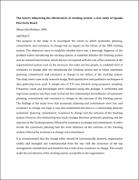| dc.description.abstract | The purpose of the study is to investigate the extent to which systematic planning, commitment and resistance to change had an impact on the failure of the UEB clocking system. The objectives were to establish whether there was a thorough diagnosis of the problem before introducing the clocking system, to establish whether the Clocking system was an isolated intervention, which did not correspond with the rest of the elements of the organizational system such as the structure, the tasks and the people, to establish level of resistance to change after the introducing the Clocking system and to relate systematic planning, commitment and resistance to change to the failure of the clocking system.
The study used a case study research design. Both quantitative and qualitative techniques of data gathering were used. A sample size of 174 was selected using purposive sampling. Frequency count and percentages were computed using this package. A correlation and regression analysis was then used to find out the relationships and influence of systematic planning, commitment and resistance to change on the outcome of the Clocking system.
The findings of the study were that systematic planning and commitment were low, and resistance to change was high. It was also established that there is a relationship between systematic planning, commitment, resistance to change and the outcome of the Clocking system. However, the relationship was much stronger between systematic planning, and the outcome of the Clocking system, followed by resistance to change and commitment. In other words, the systematic planning had the most influence on the outcome of the Clocking system, followed by resistance to change and commitment.
It is recommended that the change effort should be systematically planned, organization widely and managed and communicated from the top with the assurance of the top management commitment and should be the result of less resistance to change. This would make the introduction of the clocking system acceptable in the organization. | en_US |

